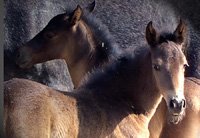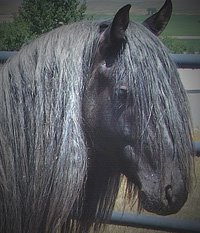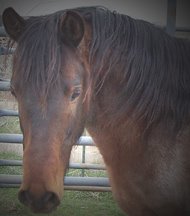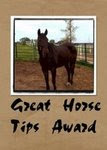 I started this series on Equine Gastric Ulcer Syndrome in an effort to help my ulcer-prone endurance horse.
I started this series on Equine Gastric Ulcer Syndrome in an effort to help my ulcer-prone endurance horse.Diagnosed over the summer with multiple, bleeding ulcers (probably the result of an impaction colic that kept him off feed for several days last fall, combined with his highly emotional nature), Aaruba has benefited from two, 30-day courses of GastroGard and the attentions of a team of excellent vets who are very experienced not only with regard to internal medicine, but in the sport of endurance as well.
Four months after diagnosis, Aaruba's condition is dramatically improved. He has put on weight and cleans up an astonishing quantity of feed. He has plenty of energy, a healthy coat, and a gleam in his eye. His bare feet are healthier than ever, his post-workout recoveries excellent, and our endurance goals for 2009 look achievable indeed.
All the same, I'm not about to let down my guard. Gastric ulcers have no respect for the thousands of dollars horse owners pour into Merial's pockets. GastroGard may allow ulcers to heal, but it doesn't prevent them from recurring...unless you can continue to administer a small, daily, $8.00 dose. Considering that the effect of long-term omeprazole use is unknown, and that omeprazole is listed by the AERC as a banned substance, endless GastroGard treatment isn't a practical option in Aaruba's case, price tag notwithstanding.
I've explored my options and settled upon the following routines for preventing EGUS here at In the Night Farm:
- I keep feed in front of the horses as much as possible. Constant access to feed appears to be the single, most important factor for prevention of EGUS.
- All horses receive some alfalfa in their diet, as it is believed that alfalfa's calcium content has a buffering effect on gastric acid.
- Horses are never worked on an empty stomach. If the horse I plan to ride hasn't finished a meal recently, I offer half a flake of alfalfa to munch while grooming and tacking up. There was a time when I would never have considered doing this, fearing it would encourage poor manners. However, there is an undeniable advantage to making endurance prospects comfortable with eating during saddling -- and expectation of imminent snacks makes the horses even happier about being caught than they were before.
- He has grass hay in front of him 100% of the time, except during workouts that total approximately 5-6 hours per week.
- He receives daily probiotics to promote general intestinal health. Right now, I'm using GUT, which is sold as an ulcer preventative containing probiotics. When the GUT runs out, however, I'll be switching to Fastrack because it contains a broader spectrum of pre- and probiotics.
- About 40 minutes before tacking up for a workout, I give Aaruba a large flake of alfalfa. 10 minutes before tacking up, he receives a pound of beet pulp (soaked) mixed with an ounce of U-Guard, a powdered antacid product. This ensures that his stomach is full and buffered when we begin work.
- Every hour during workouts, I dismount to administer a 1-ounce dose of Pro CMC, a liquid antacid, to keep Aaruba's stomach buffered.
- During long rides, we pause halfway for five or ten minutes of grazing, as a full stomach is less likely to be damaged by sloshing acid.
- To deal with the high-strung mentality that contributes to Aaruba's tendency to develop ulcers, I also have him on a maintenance dose of a product called Focus Equine. Neither drug nor herb, this powder is a vitamin/mineral blend that simply quiets Aaruba's emotions without tranquilizing or dulling him. I know, I know. It sounds like snake oil...but it works, and the company is fantastic to work with. Talking to the owner is like calling an old horsey friend. I haven't encountered such personal service in years. (By the way, if you check it out and decide to try Focus Equine, be sure to say I sent you. After buying all that GastroGard, I could really use the referral discount!)
Mostly. Though Aaruba's appetite and energy level have returned to normal, he does sometimes show reluctance to canter and a tendency to shy at objects that normally wouldn't faze him -- both possible ulcer symptoms on which I'm keeping a careful eye.
I have a stock of high-quality aloe and human-grade MSM on hand, too, should I determine Aaruba needs some extra support to fend of ulcer recurrance. Yes, it's an alternative therapy...but if 60 days of GastroGard didn't fully resolve the ulcers, I'm ready to try something else.
I also have my eye on Stomach Soother, a papaya puree reputed to have great benefit in relieving EGUS symptoms. Because traditional antacids usually contain AERC banned substances and have some undesirable side effects when used long-term, I will try replacing Aaruba's U-Guard and Pro CMC with Stomach Soother in the near future.
EGUS prevention is a long-term chore requiring careful observation, ongoing research, and experimentation to determine what works for each, individual horse. I'm certainly not done tweaking my routines -- but my hopes are high that when the 2009 endurance season rolls around, Aaruba's stomach will be ready for it.
_________________________________________________________
Related Posts
Introduction: Equine Gastric Ulcer Series
Strategies for Prevention of Equine Gastric Ulcer Syndrome
Pharmaceutical and Alternative Treatment Options for EGUS
Equine Ulcer Supplement Options
EGUS, Endurance, and the AERC
A Fair Question: Equine Athletes, Equine Ulcers
Sheer Brilliance: Aloe and MSM as Alternative Therapy for EGUS
Q & A: Aloe and MSM as Alternative Therapy for EGUS
The Good Bad News: Gastric Ulcers in Equines
_________________________________________________________
Are you enjoying this blog? We deliver!
Subscribe to The Barb Wire









8 comments:
You have really done a great job in the research on all of this and making it informative.JB and I send you and Aruba best wishes on getting this beast, known as EGUS, settled down. What a frustrating health issue.
Tamara....this was an excellent post. I applaud your efforts to keep your horse working AND healthy...Packed with great information.
Lori
man you have this covered to a T! heaven forbid my iron-stomached horse ever have ulcery upsets like this, but if we ever do, i'm sure i'll be looking back at this post for ideas and help.
Very well researched and written, thank you. And is that a PAINTING? Stunning.
Absolutely brilliant information ! We use L-Glutamine in my gelding’s diet. Nuti-Science published research regarding their product "Gastro" http://nutri-science.net/horse/gastrocare.php and
http://www.nutri-scienceusa.com/default.asp?contentID=518 I use the human grade NSI L-Glutamine power 2x a day .
I was so happy to find your site! I have a mare (Ollie) who gets horrible ulcers and we have been getting her back to 'normal' slowly. Feed, hay, etc. and now I am able to find all of the supplemental stuff that I can do for her for endurance rides! What a fabulous job you have done putting all this together :) Good luck to you and your horse.
Post a Comment